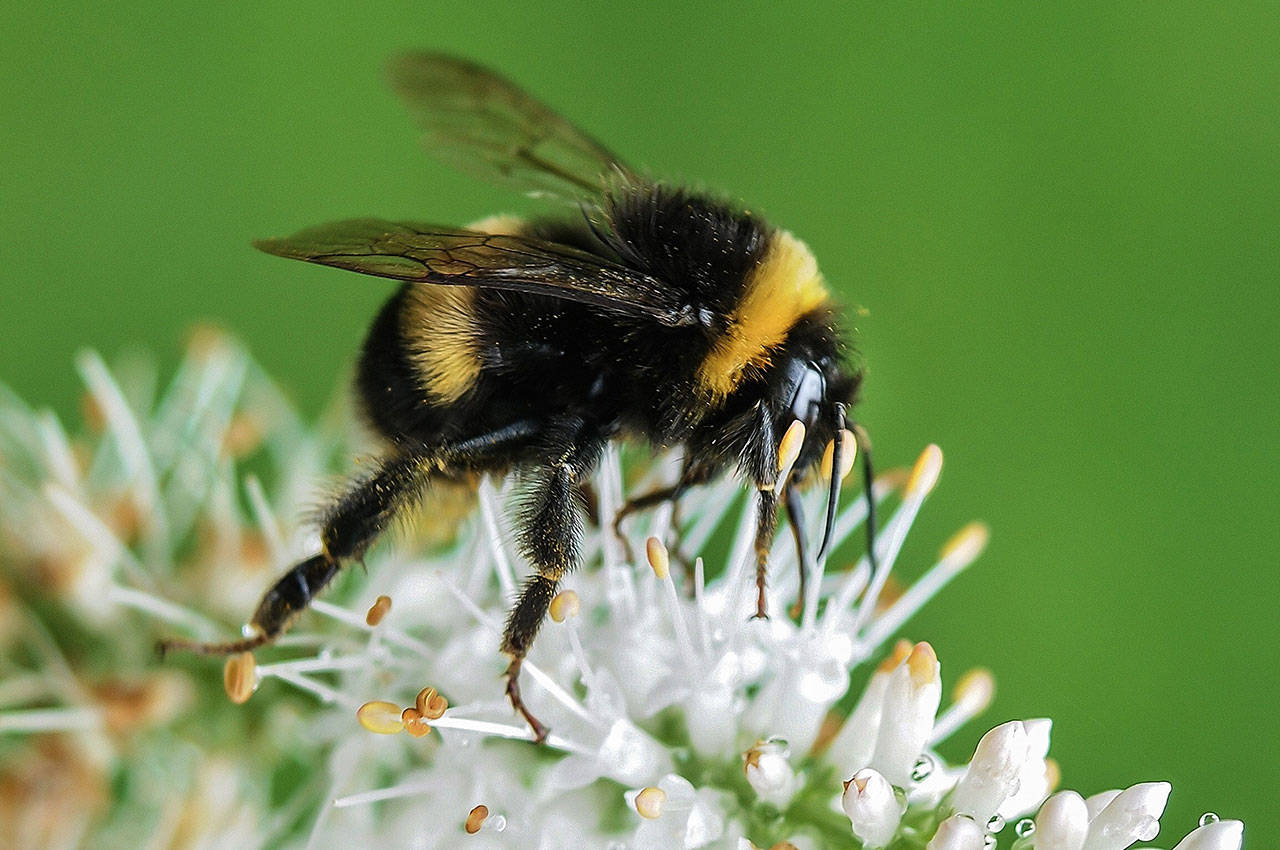The mason bee is a gentle, hard-working “bug” that looks like a fly. But it is a bee. There is growing excitement among home gardeners about this very beneficial, but somewhat mysterious, insect.
The mason bee is an important natural pollinator, particularly in light of the worldwide declining honeybee populations. And it does not sting or require a hive for local homeowners to encourage its presence.
Why discuss a bee during the dead of winter? First, it is time to plan for the springtime emergence from its overwintering cocoons. Second, we enthusiasts wish to spread the word about how gardeners can benefit the environment by increasing bee populations in their yards.
My fascination with the mason bee began nine years ago when I noticed all the giant black flies swarming around the shake roof on a shed. After learning what they were, I decided to see if I could attract them to nesting blocks. Boy was I ever successful! I have harvested up to 2,000 cocoons in a year.
CHARACTERISTICS
It is a solitary bee that nests in holes in the ground, in trees and in nesting holes created by humans. It is not aggressive, does not sting and is believed to be a better pollinator than honeybees. This is because of the extensive surface area on their hairy bodies that collects pollen compared to that on the skinny little honey bee legs.
The adults begin to emerge from their cocoons around mid-March when temperatures reach the mid 50s. The bees complete their life cycles over just a six-week period. Fortunately, their activities coincide with the bloom of most of our ornamental and fruit-bearing trees.
They deposit their eggs on a glob of pollen in their holes and seal off each one in a chamber with a mud plug. They are very resourceful in finding sources of mud in our back yards.
ATTRIBUTES
One of the greatest attributes of “raising” the bees is the satisfaction we get from helping Mother Nature pollinate our fruit trees with very little time and effort. Working with the bees is also a terrific way to involve children in a gardening project and help them to learn about beneficial insects and nature.
The bees are simple for gardeners to manage by providing nesting materials. These include specially designed nesting blocks with multiple holes, cardboard and paper tubes or homemade nesting blocks and paper tubes.
I graduated from drilling holes in a wooden block to using the nesting materials noted above. They allow home gardeners to harvest the cocoons in the fall and to clean out the pests. The cocoons can then be safely stored in the refrigerator during the winter for release the following spring.
The consistent ample harvests of apples and plums from my mini-orchard can be attributed to the bees. I thoroughly enjoy the 5 gallons of sweet apple juice I process and freeze each year.
THE NORTHWEST IS A LEADER
There are numerous internet sites that have information about the bees. But the leading source of excellent information and supplies is Crown Bees in Woodinville, Washington, owned and operated by Dave Hunter and his dedicated staff.
The company website has an amazing array of information, instructional videos on nesting sites and cocoon harvesting, plus a wide variety of supplies and cocoons available to home gardeners.
He produces a monthly “bee mail” that instructs gardeners on the proper steps to follow throughout the year and the latest news and developments on this insect. Dave has appeared at conferences around the country and is a tireless champion of the mason bee.
Visit the Crown Bees website (crownbees.com) to learn more details about mason bees. We bee enthusiasts encourage gardeners to have some fun while learning about this fascinating insect and to help benefit our environment.
Dennis Tompkins is an ISA certified arborist, ISA qualified tree risk assessor and Master Gardener from the Bonney Lake-Sumner area. He provides pest diagnosis, hazardous tree evaluations, small tree pruning and other services for homeowners and businesses. Contact him at 253-863-7469 or email at dlt@blarg.net. Website: evergreen-arborist.com.


